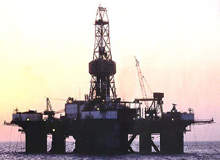
The Angolan hydrocarbons industry is currently benefiting from an expansion in the country’s offshore oil and gas fields. These have given the state owned oil and gas monopoly, Sonangol, a need to extend its refining capacity to match its enhanced oil and gas production. Angola is expected to be Africa’s biggest oil producers in the sub-sahara by 2015.
Angola has one existing refinery in Luanda with a capacity of 39,000bpd although it is currently working at about 90% capacity. The refinery is operated by Fina Petroleos de Angola, a company owned by Petrofina (64.1%) and the Angolan government (Sonangol) (34%) with the remainder of the shares in private hands. Angola refines about 30,000bpd for its domestic market and exports lubricating oils, bunkering oils and heavy fuel oil. Sonangol has devoted $10 million to finding ways of expanding the capacity of this refinery, but the real prize is the entirely new refinery in Lobito.
LOBITO REFINERY EVALUATION
After government approval in 1997, Sonangol announced in January 1998 that it would build a new 200,000bpd refinery in Lobito, a coastal city in central Angola, as a way to promote economic development in the region. Lobito is about 400km south of the Angolan capital, Luanda.
A technical team evaluated potential sites in the same month with a view to commencing construction a few months afterwards. A company called Ventech was employed in this capacity. Basic engineering began in late 2001, and construction began in early 2002. It is expected to be completed by 2006 and produce 200,000bpd at a cost of $2 billion. Sonangol is also developing an LNG project with Texaco at an estimated cost of $3 billion. This is due to go online in 2005.
MARKET RATIONALE
The majority of products refined at the new facility (80%) will be exported regionally. One of the main reasons for the choice of Lobito as a site was that it has extensive port facilities, helping the refinery to export around the region. Angola itself has a limited market, at least until the civil war ends. Even access to the interior is limited. The main route into the interior is the Benguela railway which has been damaged by the war, and is unlikely to be put back into full working order whilst the war continues. Therefore, export potential to the rest of sub-Saharan Africa will be crucial to the commercial success of the project.
Angola has discussed potential partnerships for the construction of the refinery with China, Petrogal, Gabon, and most recently, the Democratic Republic of Congo. Angola is taking an interest in the war currently underway in the Democratic Republic of Congo as well as seeing Sonangol exploring for oil there. It is therefore likely that any Congo involvement would be subject to political considerations.
CONTRACTS
Samsung was given the main responsibility for building the refinery in Lobito. The Japanese company is also involved in the construction of offshore facilities for upstream production in Angola. For the Lobito project it decided to co-operate with the South Korean SK Engineering & Construction. Technip, the French contractor, recently formed a joint venture called Technip Angola Limitada. The venture is with Sonangol, which owns 40% of the shares. Linked to this, Technip was awarded the contract for project management in the Lobito refinery project.



